Hiring the right application developer can make or break your project's success. Finding candidates with the perfect blend of technical skills, problem-solving abilities, and cultural fit is crucial for building a strong development team.
This comprehensive guide provides a curated list of interview questions tailored for different experience levels, from junior to senior developers. We've also included questions focused on software architecture and situational scenarios to help you assess candidates holistically.
By using these questions, you'll be better equipped to identify top talent and make informed hiring decisions. Consider complementing your interview process with pre-employment assessments to get a more complete picture of candidates' abilities.
Table of contents
10 basic Application Developer interview questions and answers to assess applicants
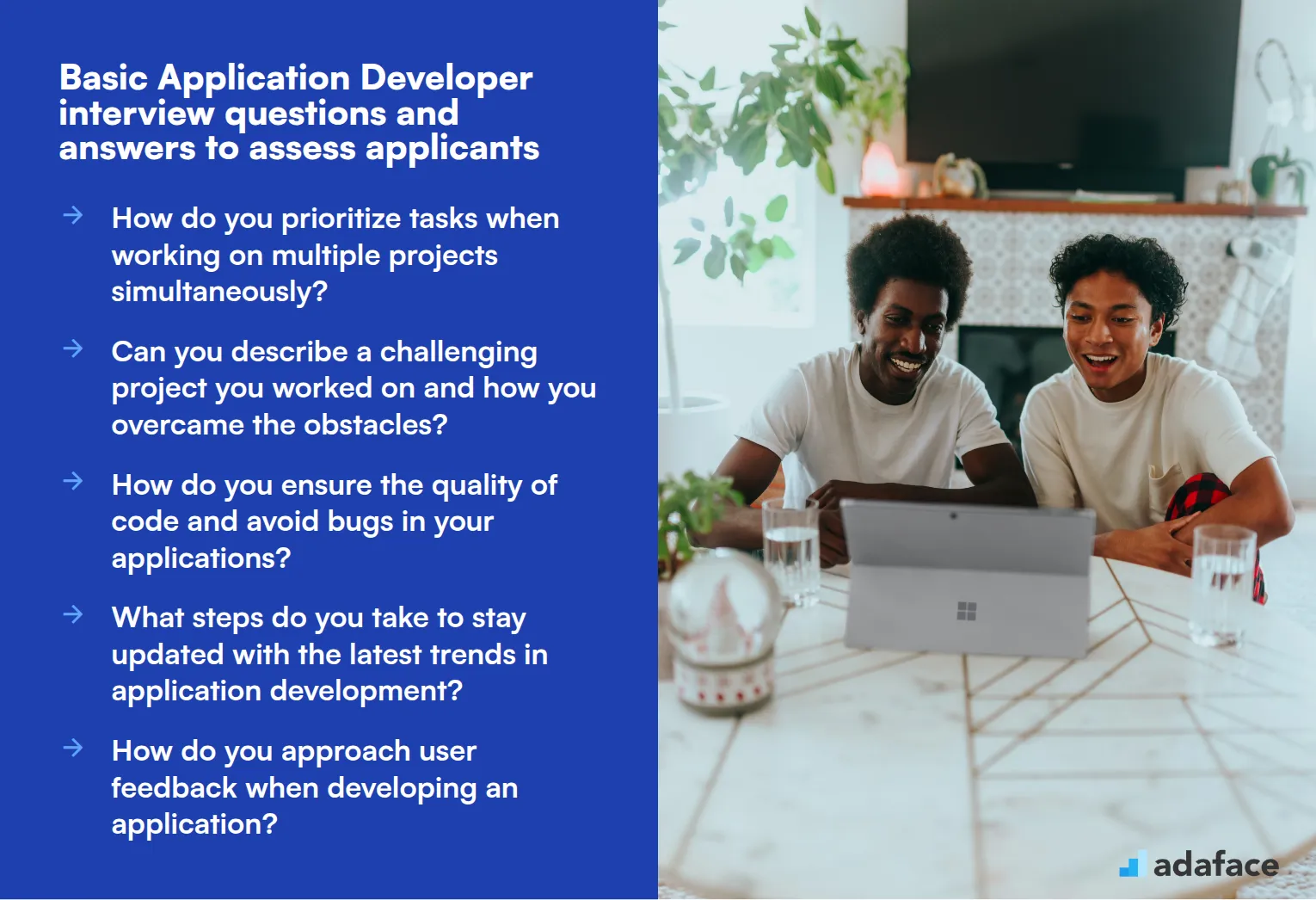
Asking the right questions during an interview is like opening a treasure chest to the applicant’s skills, mindset, and potential. With these essential questions, you can uncover whether a candidate is ready to tackle the challenges of application development, all without needing a crystal ball.
1. How do you prioritize tasks when working on multiple projects simultaneously?
A well-rounded application developer should be able to skillfully manage multiple projects. Prioritization involves assessing the urgency and importance of each task, setting clear deadlines, and perhaps even using tools like project management software to keep track of progress.
Candidates might mention techniques such as the Eisenhower Matrix or agile methodologies to manage their workload effectively. An ideal response should demonstrate their ability to organize and adapt to shifting priorities.
2. Can you describe a challenging project you worked on and how you overcame the obstacles?
Applicants should be able to discuss a specific project that presented significant challenges. They might outline the problem, the steps they took to address it, and the outcome of their efforts. This showcases their problem-solving skills and their ability to navigate complex situations.
Look for candidates who can articulate the lessons learned from the experience, emphasizing their growth and how they apply those lessons to future projects. This indicates resilience and a continuous improvement mindset.
3. How do you ensure the quality of code and avoid bugs in your applications?
Ensuring code quality is crucial for application developers. Candidates may discuss methodologies like code reviews, unit testing, and continuous integration to maintain high standards and minimize bugs.
Applicants should also mention the importance of clear documentation and collaboration with team members to catch errors early. An ideal answer will reflect a proactive approach to quality assurance and a commitment to delivering robust applications.
4. What steps do you take to stay updated with the latest trends in application development?
Staying current in the fast-paced tech world is essential. Candidates might mention following industry blogs, participating in online courses, or attending conferences and webinars as part of their ongoing education.
A strong candidate will express curiosity and enthusiasm about learning new technologies and frameworks. They should demonstrate a balance between acquiring new skills and applying them effectively in their work. For more insights, they might refer to resources on skills required for application developers.
5. How do you approach user feedback when developing an application?
User feedback is a goldmine for improvement. Candidates should explain how they gather, analyze, and implement feedback to enhance the user experience. This might involve user testing, surveys, or direct communication with end-users.
An ideal answer will show the candidate values user input and has a systematic approach for integrating feedback into development cycles. This reflects a user-centric mindset and a dedication to continuous improvement.
6. What is your experience with working in a collaborative team environment?
Application development is often a team effort. Candidates should describe their experience working with cross-functional teams, highlighting communication, collaboration, and conflict resolution skills.
A candidate who effectively shares credit, openly communicates, and supports team goals is often more successful in a collaborative environment. Look for examples that demonstrate their ability to contribute positively to a team's dynamics.
7. How do you handle tight deadlines and high-pressure situations?
Handling pressure is part of an application developer's job. Candidates should discuss stress management techniques, time management skills, and strategies for maintaining productivity under tight deadlines.
An ideal response will highlight their ability to remain calm and focused, prioritize tasks efficiently, and seek assistance when necessary. This indicates resilience and an ability to thrive in challenging environments.
8. How do you approach learning a new programming language or technology?
Adaptability is crucial in technology roles. Applicants should demonstrate their learning strategy, which might involve tutorials, building small projects, or collaborating with more experienced peers.
A strong candidate will show a systematic approach to learning and a track record of successfully acquiring new skills and applying them effectively in their work. This reflects a proactive and self-motivated attitude towards professional development.
9. What role does security play in your development process?
Security should be a priority for any developer. Candidates should discuss practices like secure coding, regular security audits, and staying informed about the latest threats and vulnerabilities.
The applicant's response should reflect a deep understanding of the importance of security measures in protecting user data and ensuring application integrity. This shows responsibility and thoroughness in their development approach.
10. How do you balance the need for functionality with user-friendly design in your applications?
Balancing functionality and usability is key to successful applications. Candidates should explain their approach to designing intuitive interfaces while ensuring robust functionality.
Look for candidates who emphasize user research, usability testing, and iterative design processes. This indicates an appreciation for both technical and user experience aspects, ensuring a well-rounded development approach.
20 Application Developer interview questions to ask junior developers
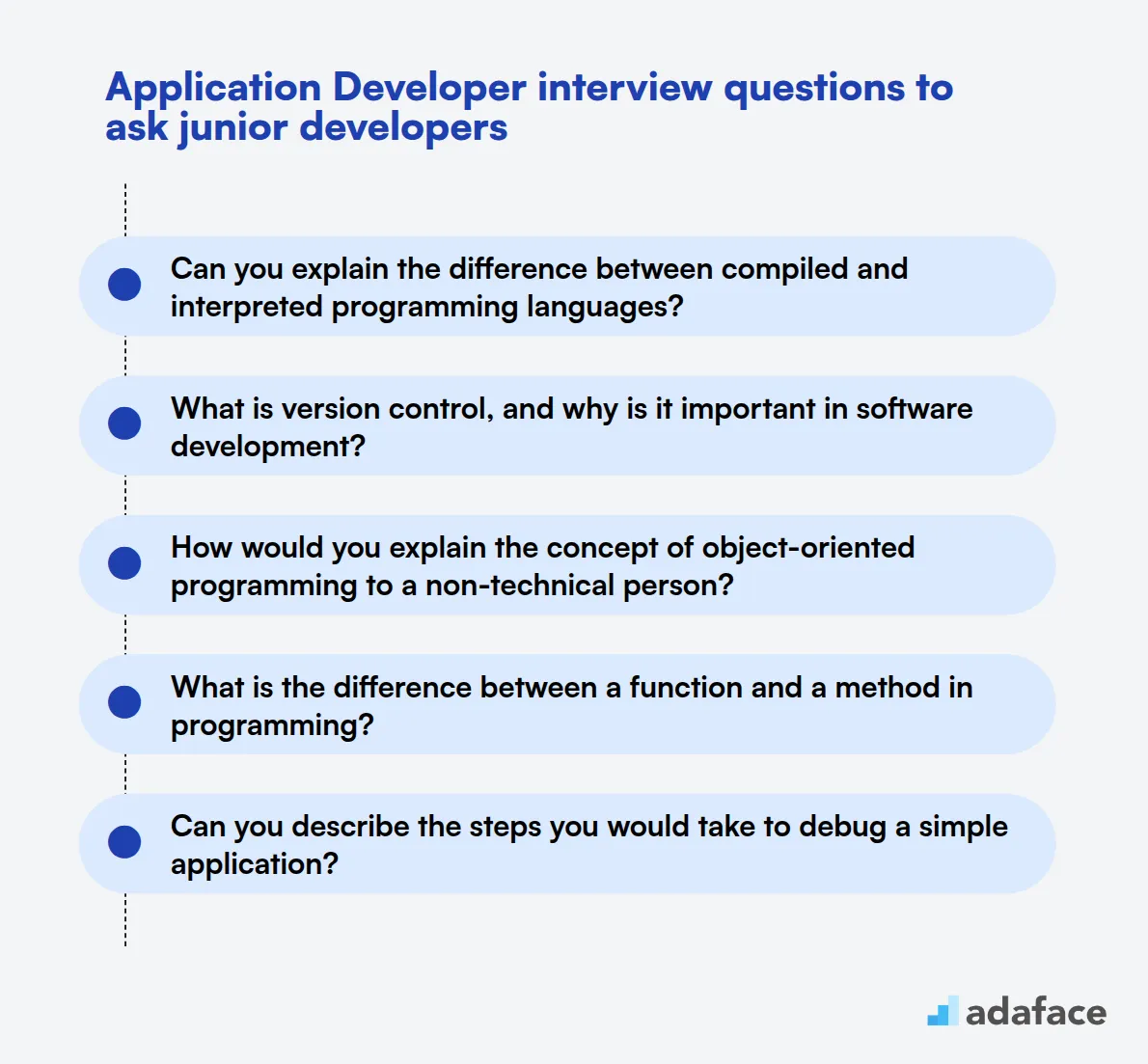
When interviewing junior application developers, it's crucial to assess their fundamental skills and potential for growth. These 20 questions are designed to help you evaluate a candidate's technical knowledge, problem-solving abilities, and understanding of development best practices. Use them to gauge the applicant's readiness for entry-level positions and their capacity to learn and adapt in a professional setting.
- Can you explain the difference between compiled and interpreted programming languages?
- What is version control, and why is it important in software development?
- How would you explain the concept of object-oriented programming to a non-technical person?
- What is the difference between a function and a method in programming?
- Can you describe the steps you would take to debug a simple application?
- What is the purpose of comments in code, and how do you decide what to comment?
- How do you approach writing clean and maintainable code?
- What is the difference between a stack and a queue in data structures?
- Can you explain what an API is and why it's important in application development?
- How would you handle an error that occurs during runtime in your application?
- What is the purpose of unit testing in software development?
- Can you describe the difference between synchronous and asynchronous programming?
- What is the significance of code refactoring, and when would you do it?
- How do you ensure that your application is responsive across different devices?
- What strategies would you use to optimize the performance of a slow-running application?
- Can you explain the concept of database normalization?
- How would you approach learning a new framework or library for a project?
- What is the importance of code review in the development process?
- How do you handle merge conflicts when working with version control systems?
- Can you describe a simple algorithm for sorting a list of numbers?
10 intermediate Application Developer interview questions and answers to ask mid-tier developers.
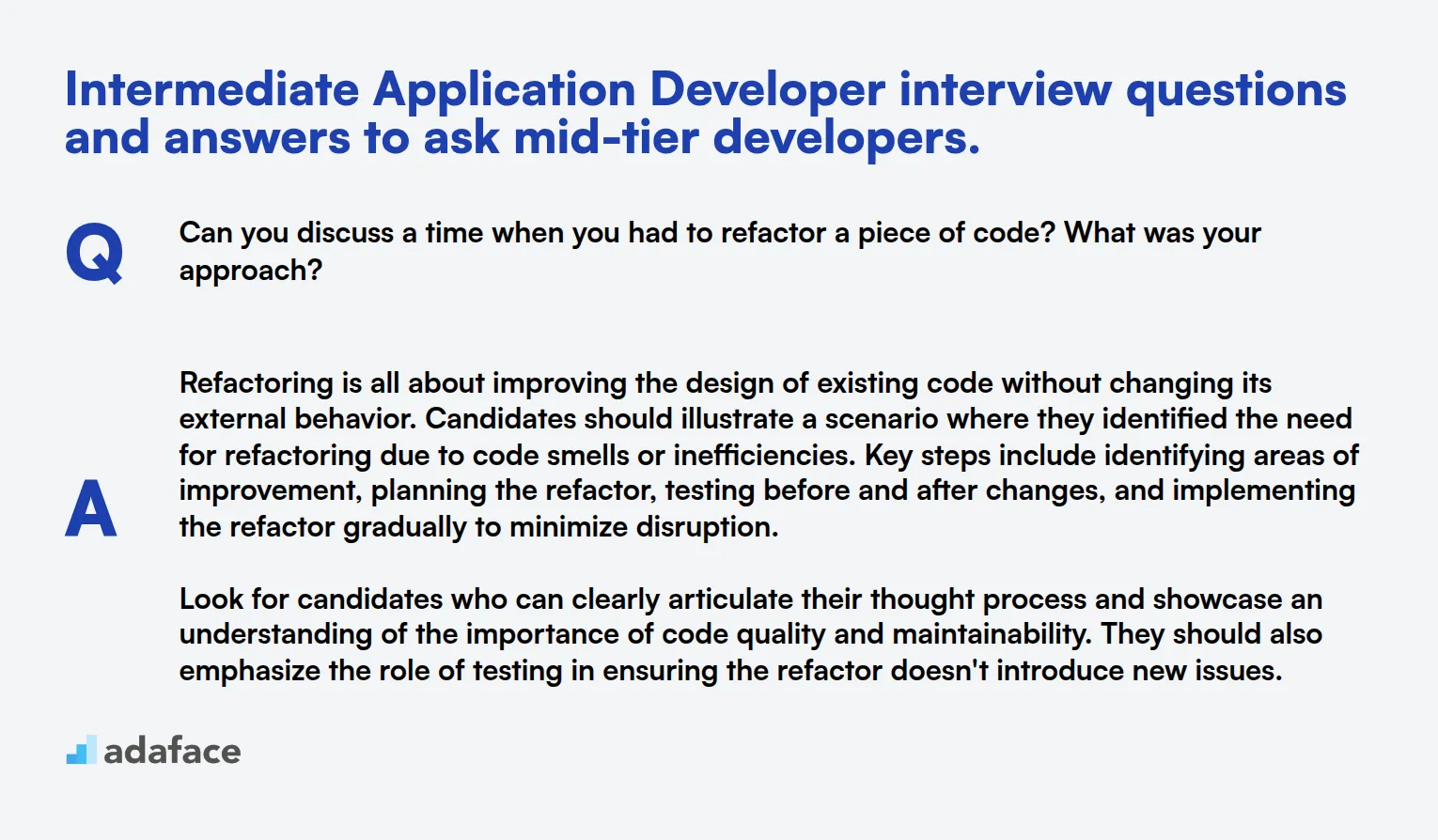
Dive into our curated list of interview questions for mid-tier application developers. These questions are designed to bring out the best in your candidates, helping you identify those who have the right blend of technical know-how and problem-solving skills. Use this list when you need to assess developers who are ready to tackle more complex challenges without getting lost in the weeds.
1. Can you discuss a time when you had to refactor a piece of code? What was your approach?
Refactoring is all about improving the design of existing code without changing its external behavior. Candidates should illustrate a scenario where they identified the need for refactoring due to code smells or inefficiencies. Key steps include identifying areas of improvement, planning the refactor, testing before and after changes, and implementing the refactor gradually to minimize disruption.
Look for candidates who can clearly articulate their thought process and showcase an understanding of the importance of code quality and maintainability. They should also emphasize the role of testing in ensuring the refactor doesn't introduce new issues.
2. How would you handle a situation where a stakeholder wants a feature that you believe is not feasible?
Navigating stakeholder demands requires a balance of technical insight and diplomacy. Candidates should demonstrate their ability to communicate technical limitations and propose alternatives or compromises in a clear and understandable manner. They might mention the importance of setting realistic expectations and the potential risks of implementing a non-feasible feature.
An ideal response would show an ability to prioritize the project's success while maintaining positive stakeholder relationships. Candidates should emphasize their skills in negotiation and their ability to provide constructive feedback.
3. Describe your experience with integrating third-party APIs into applications.
Integrating third-party APIs involves understanding the API's documentation, ensuring compatibility with existing systems, and handling any potential errors or exceptions. Candidates should describe their process of evaluating API options, testing integration, and managing authentication and security concerns.
Strong candidates will highlight their ability to troubleshoot integration issues and discuss how they ensure the API meets the application's functional requirements. Mentioning their experience with API rate limits or handling API versioning changes can provide additional insights into their expertise.
4. What approach do you take when faced with a new design pattern that you haven't used before?
When encountering a new design pattern, a systematic approach is often the best course. Candidates might talk about researching the pattern's use cases, studying examples, and implementing small-scale tests to understand its application. They should also consider how the pattern fits within the architecture of their project.
Evaluators should look for candidates who emphasize continuous learning and adaptability. A strong candidate will demonstrate a proactive approach to expanding their knowledge and applying it effectively in real-world scenarios.
5. How do you ensure your applications are scalable as user demand grows?
Scalability is critical for sustainable application growth. Candidates should discuss their strategies for designing scalable architectures, such as modular design, using load balancers, and asynchronous processing. They might also mention database optimizations, caching strategies, or the use of microservices.
Candidates should showcase an understanding of scalability considerations and demonstrate experience in anticipating and mitigating potential performance bottlenecks. Their answers should reflect both a theoretical understanding and practical experience.
6. How do you approach the documentation of your applications?
Good documentation is crucial for maintainability and collaboration. Candidates should describe their methods for creating clear and comprehensive documentation, which might include inline comments, README files, and user guides. They should emphasize the importance of keeping documentation up-to-date with code changes.
An ideal response would highlight their commitment to clarity and usability in documentation, ensuring it serves as a valuable resource for other developers and stakeholders. Look for candidates who understand that good documentation is a part of delivering quality software.
7. What steps do you take to improve the performance of an application?
Performance optimization involves identifying bottlenecks and making targeted improvements. Candidates should explain their process, which may include profiling the application, analyzing logs, and testing different optimization strategies. They might discuss techniques such as caching, database indexing, and code optimization.
Evaluators should seek candidates who can provide specific examples of performance improvements they have implemented. Their answers should demonstrate a holistic understanding of performance factors and an ability to balance improvements with other project constraints.
8. Can you share an experience where you had to learn and apply a new technology quickly?
Adapting to new technologies is a vital skill in the ever-evolving tech landscape. Candidates should recount a specific instance where they quickly learned and applied a new tool, framework, or language, detailing their learning process and how they applied the knowledge to meet project goals.
An ideal candidate will showcase their ability to learn efficiently and effectively under time constraints, emphasizing their resourcefulness and dedication to continuous improvement.
9. How do you balance technical debt with the need to deliver new features quickly?
Balancing technical debt involves making strategic decisions about when to address underlying code issues versus focusing on new features. Candidates should discuss their approach to prioritizing tasks and managing technical debt, possibly by scheduling regular code reviews or refactor sessions.
Look for candidates who understand the long-term implications of accumulating technical debt and can articulate strategies to manage it while keeping project timelines in mind. They should demonstrate an ability to communicate trade-offs to stakeholders.
10. How do you handle negative feedback on your application from users?
Feedback, whether positive or negative, is an opportunity for growth. Candidates should describe how they approach user feedback constructively, engage in active listening, and prioritize issues based on user impact and feasibility. They may also mention methods for communicating with users about upcoming changes or improvements.
Strong candidates will show empathy and resilience, viewing negative feedback as a chance to enhance their application's value. They should demonstrate a customer-centric approach and a commitment to continuous improvement.
15 advanced Application Developer interview questions to ask senior developers
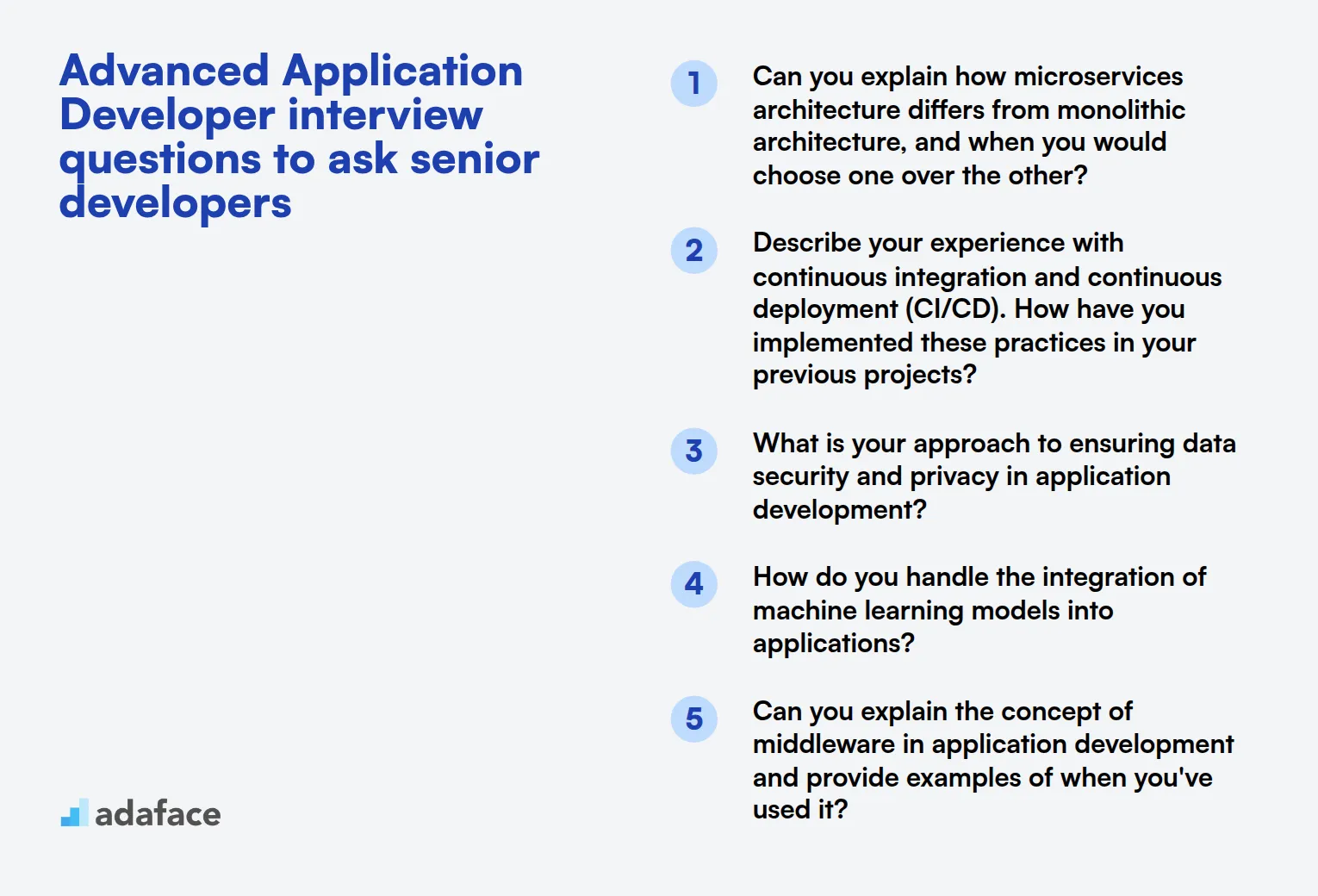
To assess whether candidates possess the advanced skills and experience necessary for senior application developer roles, ask them some of these targeted interview questions. These questions are designed to help hiring managers identify individuals who can tackle complex challenges and drive innovation within your development team.
- Can you explain how microservices architecture differs from monolithic architecture, and when you would choose one over the other?
- Describe your experience with continuous integration and continuous deployment (CI/CD). How have you implemented these practices in your previous projects?
- What is your approach to ensuring data security and privacy in application development?
- How do you handle the integration of machine learning models into applications?
- Can you explain the concept of middleware in application development and provide examples of when you've used it?
- How do you approach optimizing database queries to improve application performance?
- What strategies do you implement to ensure high availability and disaster recovery in your applications?
- Can you discuss your experience with cloud platforms? How do you decide which services to use for a project?
- How do you approach designing APIs to ensure they are scalable and easy for other developers to use?
- Can you describe a time when you had to design a system architecture from scratch? What were your key considerations?
- What is your experience with performance profiling and tuning? Can you share an example where you improved application performance?
- How do you ensure your application is compliant with relevant regulations and standards?
- What are the key considerations you take into account when selecting a technology stack for a new project?
- How do you handle legacy code when integrating it into new development projects?
- Can you explain the concept of event-driven architecture and provide examples of how you've implemented it?
8 Application Developer interview questions and answers related to software architecture
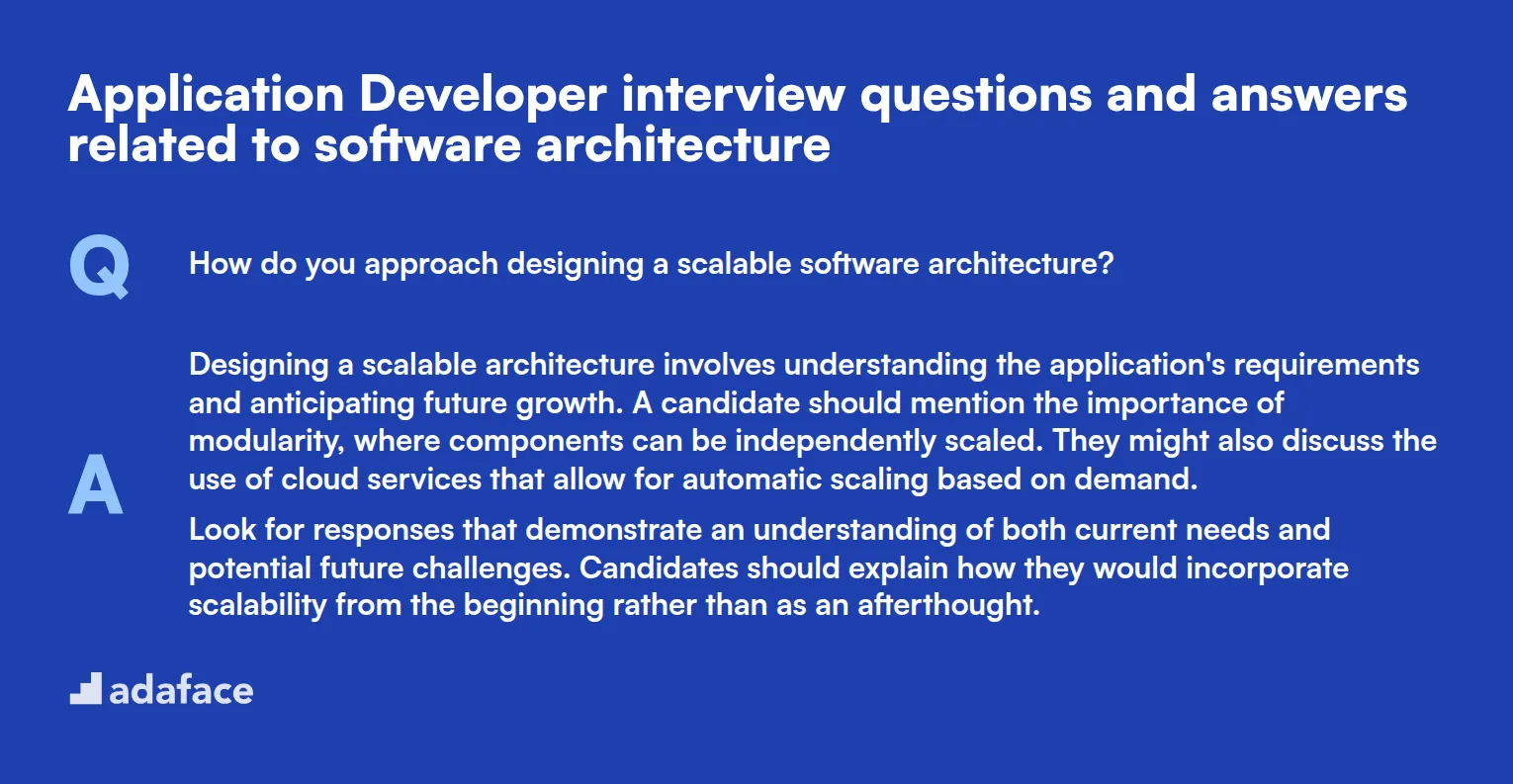
Navigating the maze of software architecture can be daunting, even for seasoned developers. This list of interview questions will help you identify candidates who can think critically about architecture and design decisions. Use these questions to uncover insights into their problem-solving abilities and decision-making skills when it comes to building robust software solutions.
1. How do you approach designing a scalable software architecture?
Designing a scalable architecture involves understanding the application's requirements and anticipating future growth. A candidate should mention the importance of modularity, where components can be independently scaled. They might also discuss the use of cloud services that allow for automatic scaling based on demand.
Look for responses that demonstrate an understanding of both current needs and potential future challenges. Candidates should explain how they would incorporate scalability from the beginning rather than as an afterthought.
2. Can you explain the concept of a microservices architecture and its benefits?
Microservices architecture involves breaking down an application into smaller, independent services that communicate over a network. Each microservice is responsible for a specific business function and can be deployed, scaled, and maintained independently.
Benefits of microservices include increased flexibility, easier scalability, and improved resilience. Because services can be upgraded independently, it allows for more rapid development and deployment cycles.
When evaluating answers, listen for a clear understanding of how microservices can improve both the development process and the overall robustness of the application. An ideal candidate might also address potential challenges, such as managing the complexity of service communication.
3. How do you decide which technology stack is appropriate for a project?
Choosing the right technology stack involves evaluating the project requirements, the team's expertise, and the long-term maintenance considerations. A candidate should mention factors like performance, scalability, and community support when selecting technologies.
They might also discuss the importance of aligning the stack with the project's goals and the existing organizational infrastructure, ensuring compatibility and efficiency.
Seek candidates who can not only select appropriate technologies but also justify their choices with clear reasoning. Look for insights into how they balance innovation with practicality, which is crucial for any software developer.
4. What factors do you consider when deciding to use a monolithic or a microservices architecture?
The choice between monolithic and microservices architectures depends on the complexity and scale of the application. Monolithic architectures are simpler and can be easier to develop for smaller projects, while microservices offer greater flexibility and scalability for larger, more complex applications.
Candidates should consider factors such as team size, deployment frequency, and the need for independent scaling of components. They might also discuss the trade-offs in terms of complexity and overhead associated with managing multiple services.
A strong candidate will articulate these considerations clearly and provide examples of scenarios where each architecture would be appropriate, demonstrating their strategic thinking and architectural insight.
5. How do you ensure that your software architecture is resilient?
Ensuring resilience involves designing the system to withstand failures and continue operating. Candidates might discuss strategies such as redundancy, where critical components are duplicated, and failover mechanisms that automatically switch to backups in case of a failure.
Other considerations include implementing circuit breakers to prevent cascading failures and designing with fault tolerance in mind, ensuring that individual component failures do not bring down the entire system.
Look for candidates who understand the importance of testing for resilience, including load testing and failure simulations. They should be able to convey a proactive approach to identifying and mitigating potential points of failure.
6. What is the role of middleware in software architecture?
Middleware acts as a bridge between different components of an application, facilitating communication and data management. It often provides services such as authentication, logging, and data transformation, enabling different parts of a system to work together seamlessly.
Candidates may describe specific middleware solutions they've used, such as message brokers or application servers, and how these tools helped streamline the development process and improve system integration.
An ideal response will demonstrate an understanding of the middleware's capabilities and limitations, as well as an ability to integrate it effectively into a broader architectural plan.
7. How do you evaluate the performance of an existing software architecture?
Evaluating performance involves measuring key metrics such as response time, throughput, and resource utilization. Candidates should describe how they use tools for profiling and monitoring to identify bottlenecks and areas for improvement.
They might also discuss the importance of considering both current performance and how the architecture will scale as user demand increases, ensuring that optimizations align with future needs.
Seek candidates who can articulate a methodical approach to performance evaluation, focusing on data-driven analysis and a strong understanding of both the technical and business impacts of their findings.
8. What strategies do you use to ensure security in your software architecture?
Security involves multiple layers, including secure coding practices, authentication, authorization, and regular security audits. Candidates should mention designing with secure defaults and employing encryption for sensitive data both in transit and at rest.
They might also highlight the importance of staying updated with the latest security patches and actively monitoring for vulnerabilities, ensuring that security is an ongoing priority throughout the software lifecycle.
A strong response will show a comprehensive understanding of security best practices and a proactive approach to mitigating potential threats. Look for candidates who view security as integral to the application development process, not just an afterthought.
9 situational Application Developer interview questions with answers for hiring top developers
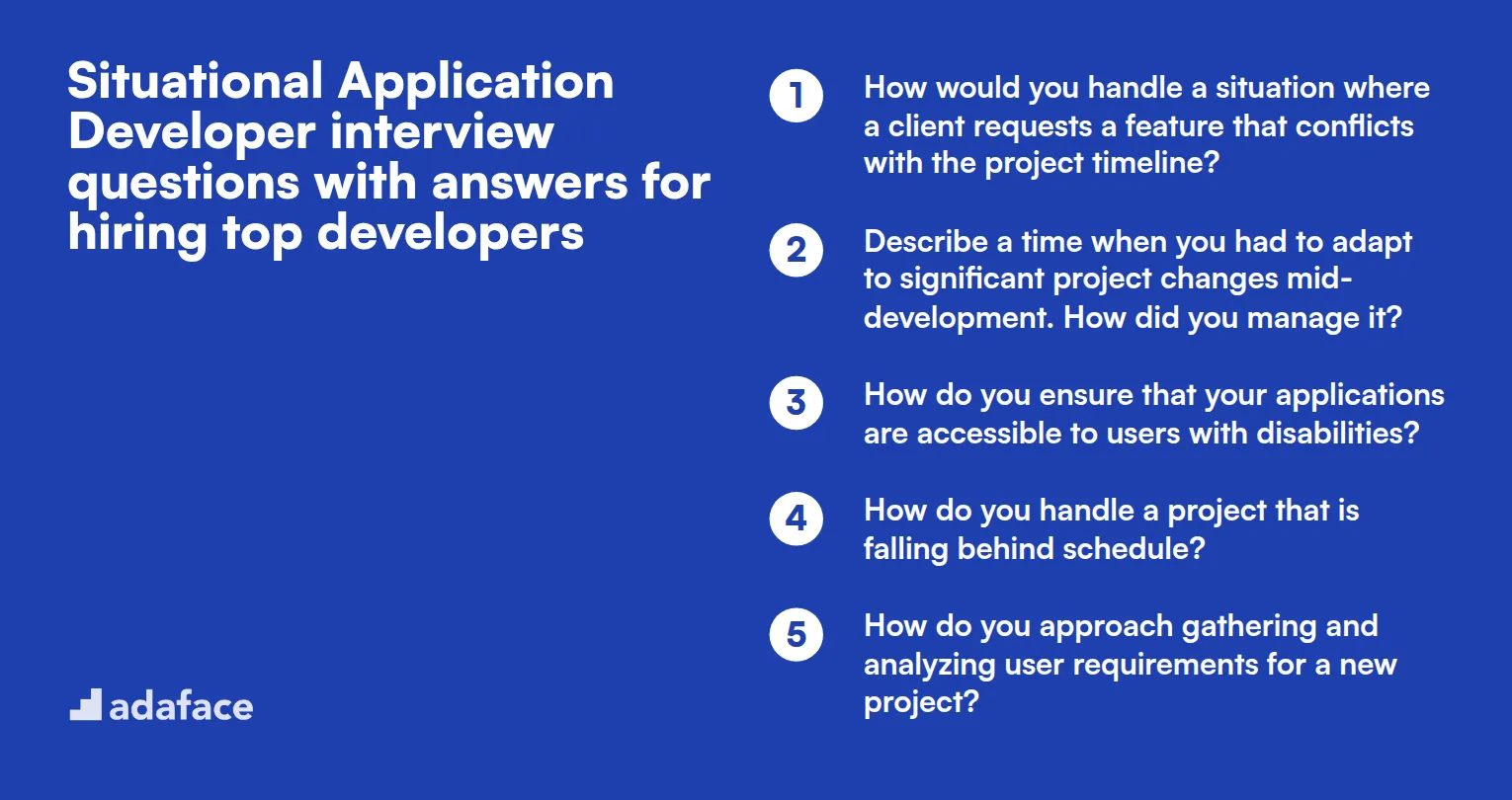
Navigating the world of application development interviews can feel like solving a complex puzzle. To help you piece it all together and find the perfect fit for your team, we've compiled a list of situational questions designed to reveal the skills and mindset of top developers. These questions are crafted to illuminate how candidates tackle real-world challenges and ensure they're well-suited to contribute to your dynamic projects.
1. How would you handle a situation where a client requests a feature that conflicts with the project timeline?
A skilled developer will first seek to understand the client's needs and the importance of the requested feature. They might propose alternative solutions or adjustments that could satisfy the client's desires without derailing the project timeline.
The developer should communicate clearly about the potential impacts of adding the feature, including any delays or increased costs. They might suggest prioritizing essential elements and scheduling the new feature for a later phase.
An ideal response will reflect strong communication skills, the ability to manage client expectations, and a focus on maintaining project integrity while considering client satisfaction.
2. Describe a time when you had to adapt to significant project changes mid-development. How did you manage it?
A strong candidate will describe their process of quickly assessing the new requirements and how they adjusted their strategy to accommodate the changes. They might mention collaborating with the team to redistribute tasks and resources effectively.
They should highlight their flexibility and problem-solving skills, demonstrating how they kept the project on track despite the changes. This could involve prioritizing tasks or trimming non-essential features.
Look for candidates who exhibit resilience, a positive attitude towards change, and the ability to maintain productivity in the face of unexpected developments.
3. How do you ensure that your applications are accessible to users with disabilities?
A well-rounded developer will mention their commitment to implementing accessibility standards, such as the Web Content Accessibility Guidelines (WCAG). They should discuss testing for accessibility and using tools to check compliance.
They might describe using semantic HTML, providing text alternatives for non-text content, and ensuring keyboard navigability as part of their development process.
An ideal response should show an understanding of the importance of accessibility in reaching a broader audience and a commitment to inclusive design practices.
4. How do you handle a project that is falling behind schedule?
A proactive developer will first analyze the causes of the delay and then work on a plan to get back on track. This might involve reallocating resources, adjusting timelines, or streamlining processes.
They should communicate openly with stakeholders about the delay and outline the steps being taken to address it. Collaboration with the team to find solutions and share responsibilities is crucial.
Look for candidates who demonstrate leadership, a solutions-oriented mindset, and the ability to manage stress and maintain productivity under pressure.
5. How do you approach gathering and analyzing user requirements for a new project?
Candidates should describe a structured approach to gathering requirements, such as conducting interviews, surveys, or workshops with stakeholders to understand their needs and expectations.
They might talk about creating user stories or personas to capture and prioritize these requirements effectively. Analyzing user feedback and iterating on the requirements is also essential.
An ideal candidate will showcase strong communication skills, attention to detail, and a user-centric mindset, ensuring the final product aligns with user needs and expectations.
6. Can you describe a situation where you had to mentor a junior developer?
A strong candidate will share an experience where they provided guidance and support to a junior developer, focusing on knowledge transfer and skill development.
They might discuss setting clear learning objectives, offering constructive feedback, and encouraging problem-solving and critical thinking.
Look for candidates who demonstrate patience, empathy, and a willingness to invest in the growth of others, which can foster a collaborative and supportive team environment.
7. How do you ensure continuous improvement in your development process?
A forward-thinking developer will describe their commitment to regular process evaluations and adopting new methodologies or tools that enhance efficiency and quality.
They might mention participating in retrospectives, gathering team feedback, and staying informed about industry trends and best practices.
Candidates should demonstrate a proactive approach to learning and improvement, showcasing their dedication to evolving with the changing technological landscape.
8. What steps do you take to ensure effective communication within your development team?
A candidate who values teamwork will emphasize the importance of regular meetings and open communication channels to keep everyone aligned and informed.
They might describe using collaboration tools, setting clear expectations, and fostering an environment where team members feel comfortable sharing ideas and concerns.
An ideal response will highlight the importance of clarity, transparency, and active listening in creating a cohesive and productive team dynamic.
9. How do you prioritize user feedback when planning updates or new features for an application?
A user-focused developer will describe their method for categorizing feedback based on impact, feasibility, and alignment with business goals. They might use frameworks like the MoSCoW method to prioritize effectively.
They should also mention engaging with users to validate feedback and ensure that planned updates or features genuinely address user needs.
Look for candidates who can balance user demands with technical and business constraints, demonstrating the ability to make informed decisions that enhance user satisfaction and product success.
Which Application Developer skills should you evaluate during the interview phase?
Interviewing an Application Developer can be as much about understanding the candidate's technical prowess as it is about gauging their ability to adapt and solve problems. While a single interview can't cover every facet of a candidate's skill set, there are core skills that are crucial to evaluate during the interview phase.
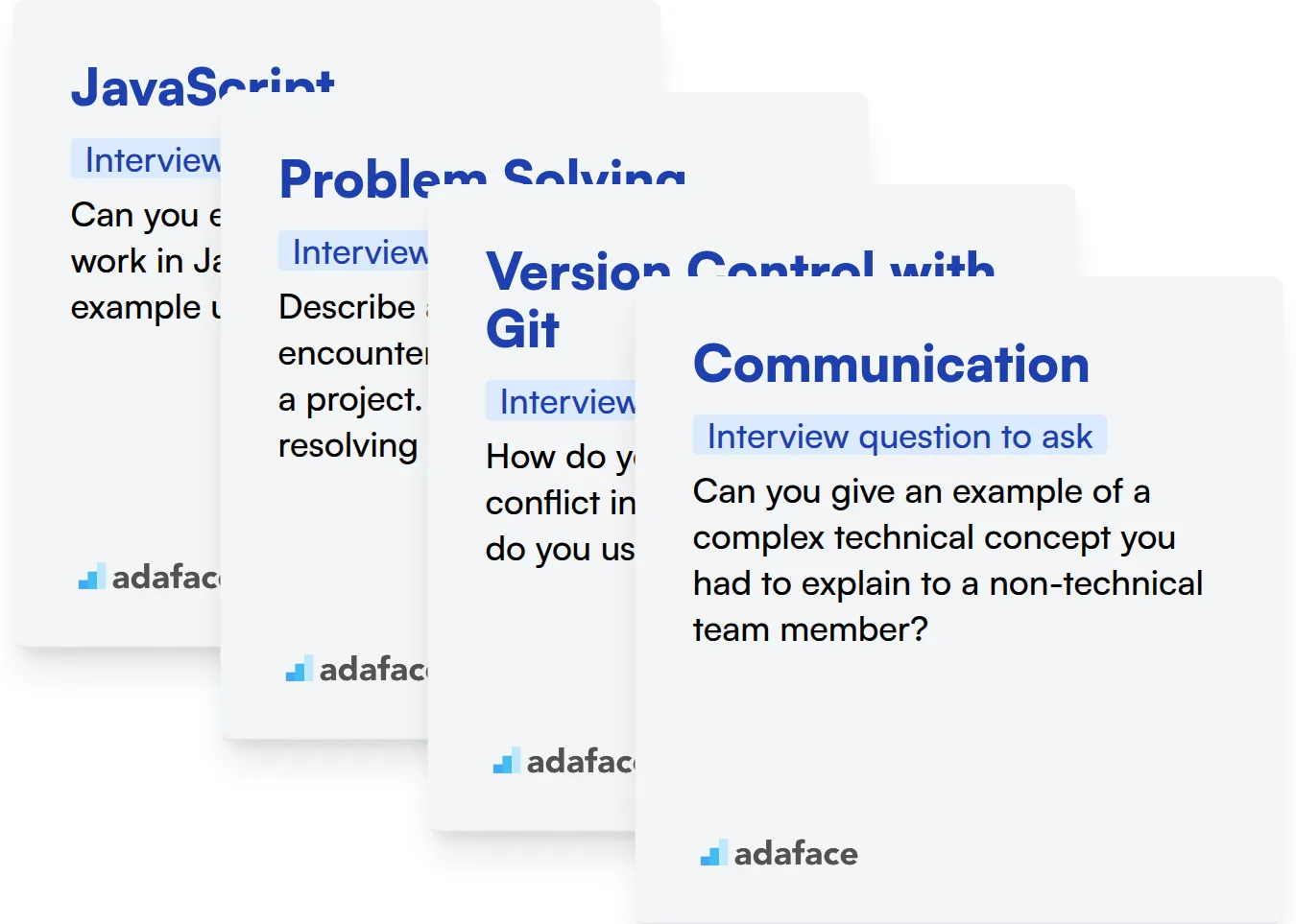
JavaScript
You can use an assessment test that includes relevant MCQs to evaluate a candidate's knowledge of JavaScript. This can help identify their capability and comfort level with JavaScript concepts and applications.
In addition to assessments, you can ask targeted interview questions that focus on JavaScript to assess a candidate's depth of knowledge.
Can you explain how closures work in JavaScript and provide an example use case?
When asking this question, look for candidates who can clearly explain the concept of closures, including their benefits and potential pitfalls. A strong answer will include an example that demonstrates practical application.
Problem Solving
To evaluate problem-solving skills, consider asking questions that present hypothetical scenarios or past experiences that required creative solutions.
Describe a time when you encountered a challenging bug in a project. How did you approach resolving it?
Look for candidates who can methodically describe their problem-solving process, emphasizing their analytical skills and how they overcame obstacles to find a solution.
Version Control with Git
Consider utilizing a Git assessment test with MCQs to gauge an applicant's familiarity and skill in using Git for version control.
During interviews, asking specific questions about Git usage can provide insights into a candidate's practical skills and understanding of collaborative workflows.
How do you resolve a merge conflict in Git, and what strategies do you use to prevent them?
Expect responses to detail the candidate's process for handling merge conflicts and their proactive measures to minimize occurrences, reflecting their command over Git workflows.
Communication
Consider posing questions that explore how candidates communicate technical concepts and collaborate in team settings.
Can you give an example of a complex technical concept you had to explain to a non-technical team member?
Candidates should demonstrate an ability to simplify complex ideas into understandable terms, showing their capability to bridge gaps between technical and non-technical audiences.
Streamline Your Application Developer Hiring Process with Skills Tests and Targeted Interviews
When hiring an Application Developer, it's important to verify their skills accurately. This ensures you bring on board someone who can truly contribute to your projects and team.
The most effective way to assess these skills is through targeted tests. Consider using our Application Developer Test or specific tests like JavaScript or React to evaluate candidates' technical abilities.
After candidates complete these tests, you can shortlist the top performers for interviews. This approach saves time and ensures you're talking to the most qualified applicants.
Ready to improve your hiring process? Sign up to access our test library and start identifying the best Application Developers for your team.
TypeScript Online Test
Download Application Developer interview questions template in multiple formats
Application Developer Interview Questions FAQs
This post covers basic, junior, intermediate, advanced, architecture-related, and situational interview questions for Application Developers.
The post includes 10 basic, 20 junior, 10 intermediate, 15 advanced, 8 architecture-related, and 9 situational interview questions.
Yes, the post includes sample answers for many of the interview questions to help guide interviewers in evaluating responses.
These questions can help assess candidates' technical skills, problem-solving abilities, and cultural fit, leading to more informed hiring decisions.

40 min skill tests.
No trick questions.
Accurate shortlisting.
We make it easy for you to find the best candidates in your pipeline with a 40 min skills test.
Try for freeRelated posts
Free resources




